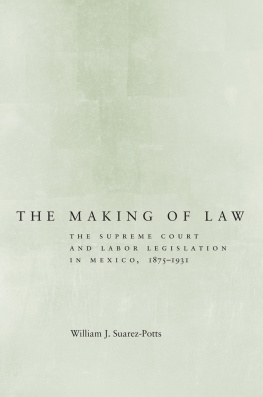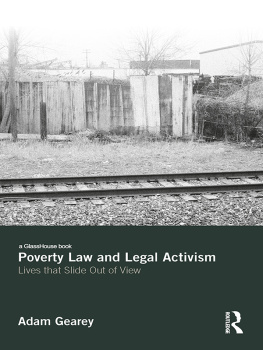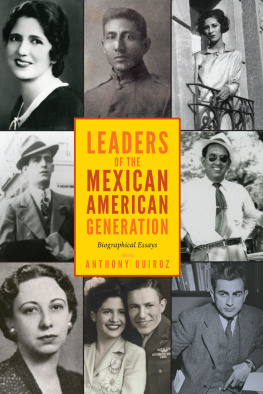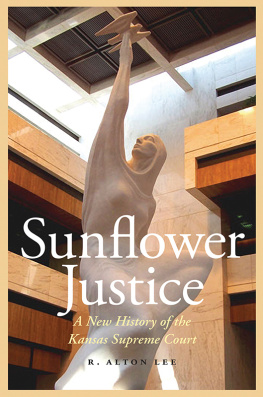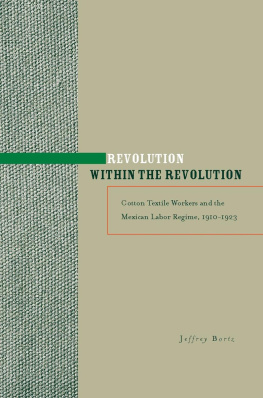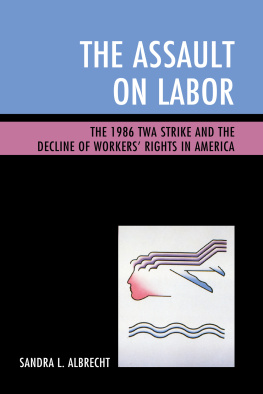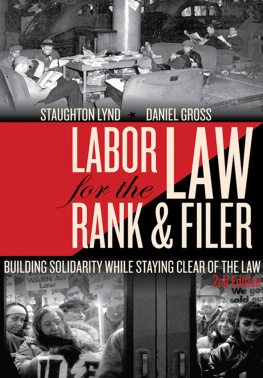Stanford University Press
Stanford, California
2012 by the Board of Trustees of the Leland Stanford Junior University. All rights reserved.
This book has been published with the assistance of Kenyon College.
No part of this book may be reproduced or transmitted in any form or by any means, electronic or mechanical, including photocopying and recording, or in any information storage or retrieval system without the prior written permission of Stanford University Press.
Printed in the United States of America on acid-free, archival-quality paper
Library of Congress Cataloging-in-Publication Data Suarez-Potts, William J., author.
The making of law : the Supreme Court and labor legislation in Mexico, 18751931 / William J. Suarez-Potts.
pages cm
Includes bibliographical references and index.
ISBN 978-0-8047-7551-9 (cloth : alk. paper)
ISBN 978-0-8047-8348-4 (e-book)
1. Labor laws and legislationMexicoHistory. 2. Mexico. Suprema Corte de JusticiaHistory. I. Title.
KGF1777.S83 2012
344.7201dc23
2012009456
Typeset by Westchester Book Services in 10/15 Sabon
T HE MAKING OF LAW
THE SUPREME COURT AND LABOR LEGISLATION IN MEXICO, 18751931
William J. Suarez-Potts
STANFORD UNIVERSITY PRESS
Stanford, California
To Mimi and Moramay
Contents
Ac knowledgments
I could not have written this book without the support of many individuals and institutions. Kenyon College has assisted me in the realization of this project since 2006. The Center for U.S.Mexican Studies at the University of California, San Diego, and its staff provided a hospitable environment that facilitated writing the dissertation on which this book is based. Eric Van Young was particularly supportive of a legal history covering modern Mexico. Javier Garciadiego graciously authorized my affiliation with the Colegio de Mxico while I was still a graduate student residing in Mexico City. Mellon Foundation fellowships helped fund early research from which this book evolved. Norris Pope of Stanford University Press as editor and Michael Haggett as production editor have greatly facilitated this publication.
The staff at the Archivo Histrico de Vicente Lombardo Toledano, located at the Universidad Obrera de Mxico, in Mexico City, warmly nurtured my research there. The staff at Harvard Law Schools international legal studies library patiently found and retrieved old Mexican legal tomes on countless occasions. The Hemeroteca Nacional at the UNAM in Mexico City welcomed me to their alcove. Kenyon College librarians have tirelessly sorted interlibrary loan books related to this study.
Parts of was published as The Railroad Strike of 1927: Labor and Law After the Mexican Revolution, in Labor History, vol. 52, no. 4 (2011): 72355.
While the legal historiography of Mexico since independence is scant, there is much scholarship on the nations labor movements, and this book has benefited from it. Studies by Kevin Middlebrook, Graciela Bensusn, Rodney Anderson, and the multiple volumes of La clase obrera en la histora de Mxico, coordinated by Pablo Gonzlez Casanova, to name but a few, have invaluably informed my narrative. It is also appropriate to acknowledge the legal scholarship of Mario de la Cueva and Vicente Lombardo Toledano, and that of Christopher Tomlins, Morton Horwitz, Duncan Kennedy and Karl Klare. This legal and historical scholarship have influenced my interpretation of Mexican legal and labor history. Any misreading is of course my doing.
A few of the colleagues who have shared their perspectives about Mexican legal studies and labor history, or in some manner furthered this project since its inception, include Oliver Dinius, Aurora Gmez-Galvarriato Freer, Daniel Gutirrez, Aaron Navarro, Halbert Jones, Line Schjolden, Juan Manuel Palacio, Miles Rodrguez, Jos Miguel Torres, Amilcar Chall, Alejandra Nez-Luna, T. M. James, Pablo Mijangos y Gonzlez, Emilio Kour, and, especially, Moramay Lpez-Alonso. Edward Beatty constructively suggested changes to a draft of this book. Louis Surez-Potts and Mimi Potts gave of themselves so that I could complete this book.
Among the mentors who guided this project initially, the professors on my dissertation committee at Harvard University stand out. John Coatsworths incisive awareness of the importance of legal history for a more complete understanding of Mexico since independence provided the first and essential orientation needed to begin contemplating this study. Had he not insisted that law might have mattered during the national period in Mexico, it is doubtful that I would have pursued such a project. (My skepticism then about the value of the legal historical study of modern Mexico was similar to that of other scholars of Latin America.) Charles Donahue Jr. taught me legal history as no other legal historian could have, generously sharing his approaches to the subject. More recently, he has encouraged me to persist with the study of a region whose legal history merits attention. John Womack Jr. first unobtrusively guided me throughout the duration of graduate study and the writing of a dissertation. Since then, he has provided further moral support. The value of his counsel has been incommensurable. The shortcomings of this book, however, are solely the result of my work.
Introduction
This book is a history of the development of labor law in Mexico from 1875 to 1931. Contemporaries from the late nineteenth century through the 1930s considered labor law progressive, reformist, or a threat to private property and capitalism. Arguably, labor law sometimes manifested these characteristics. It did, from almost any viewpoint, matter in the constitution of the state after 1917, as well as for workers and businesses negotiating conditions of employment and production both before and after the 1910 revolution. That labor law was important politically, socially, and economically in Mexico, however, may seem peculiar for two reasons. Since the country was predominantly agricultural throughout the period in which labor law largely evolved1875 to 1931it is counterintuitive that a field of law normally associated with industrial relations should have been so significant for the nations polity and economy. Moreover, in view of the reality that the rule of law, or estado de derecho, did not typify the nations social and political systems in this period, it appears contradictory that legal institutions and discourses became central elements of industrial relations. Yet as peasants lands were divided and then concentrated in large landholdings in the second half of the nineteenth century, more agricultural production was organized with wage labor.
Nineteenth-century liberal legal principles and institutions, however, were inadequate to accommodate fully workers interests by the first years of the twentieth century. A new legal field was necessary if legal discourse was to be relevant in the modern world. The social (or labor) question, as it came to be called, demanded an answer. That phrase had been used since at least the mid-1800s, and it circulated throughout the Atlantic world by the end of the nineteenth century, including Latin America.
Labor law like workers movements in this country became interrelated with the events, political contests, and social struggles of 191020 and thereafter: the Mexican Revolution. Labor reform certainly was one item of the social agendas or pronouncements of the revolutionary factions who fought one another; still, the relationship among workers, other classes, revolutionary leaders, and social reform was complex. The insurrection and civil wars of 191017, insofar as they were not primarily political contests, largely had an agrarian social basis. This book suggests further that given the importance of labor law for the new state and workers organizations, the federal judiciarys adjudication of labor disputes and interpretation of new legal principles were also significant in the evolution of the nations political and social contours after 1917.

